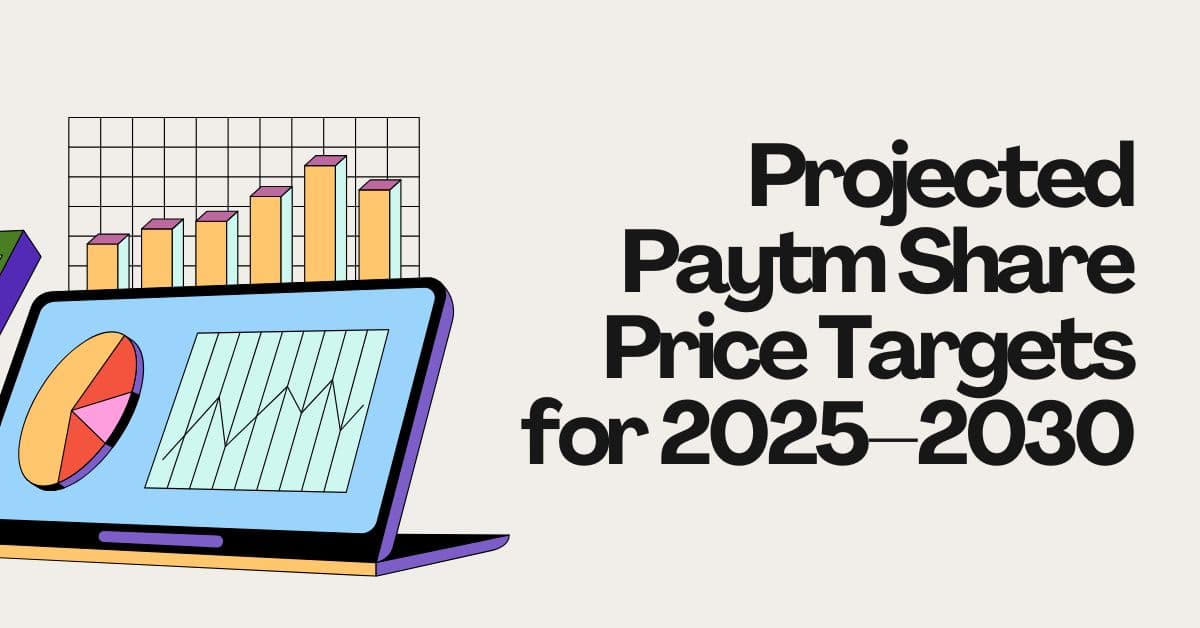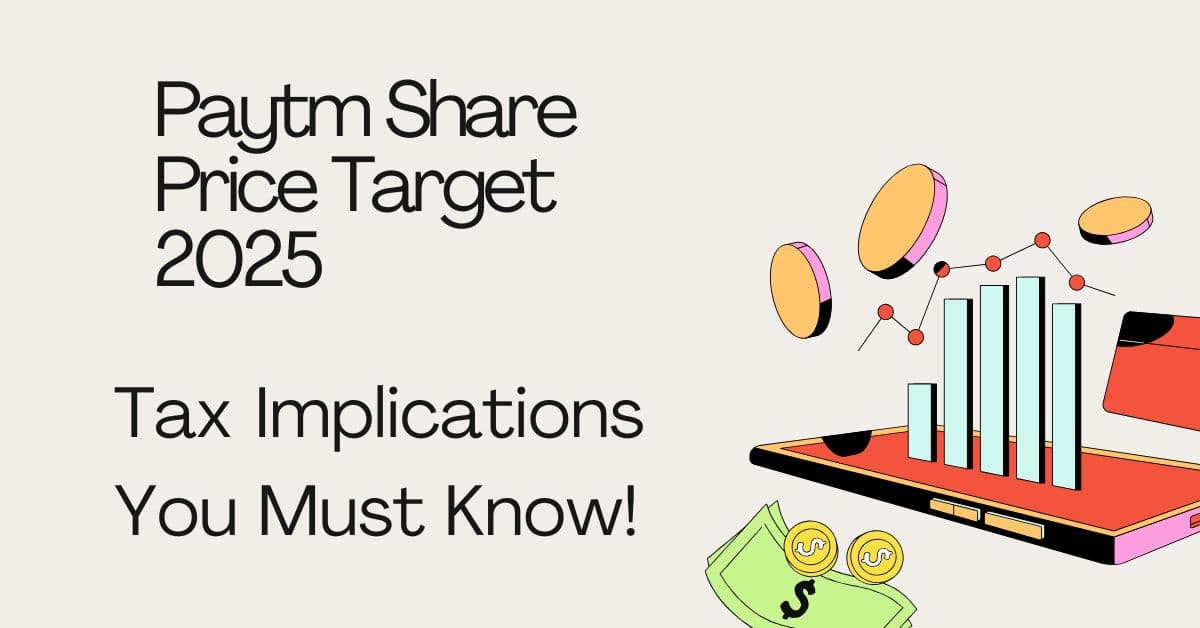Paytm Share Price Target 2025: Paytm (One97 Communications Ltd.) is still a major force in the thriving fintech industry in India, propelling innovation in financial services and digital payments. Investors are keeping a watch on Paytm’s share price forecasts for 2025 as a result of its stock getting attention following regulatory problems and a robust comeback in 2024. A range of ₹878 to ₹1,485 is projected by analysts for 2025, driven by Paytm’s strong business strategy and expanding market dominance. However, in order to maximise profits and guarantee adherence to Indian tax regulations, it is essential to comprehend the tax ramifications of investing in Paytm shares. This article explores Paytm’s share price forecast for 2025, important growth factors, and crucial tax issues for investors as of June 3, 2025.
Paytm Share Price Target 2025
Founded in 2010 by Vijay Shekhar Sharma, Paytm has revolutionised digital payments in India by offering financial products like insurance and loans along with services like Paytm Wallet and UPI. Notwithstanding legislative obstacles in 2024, like as limitations on Paytm Payments Bank, the business has proven resilient, as seen by the strong recovery of its shares. According to current analyst projections, the following are the anticipated share price goals for 2025:
- Minimum Target: The minimum target of ₹878, which reflects cautious optimism in the face of competition and market instability.
- Maximum Target: Paytm’s development in tier-2 and tier-3 cities, the expansion of financial services, and technical innovation are the main drivers of the maximum target of ₹1,485.
- Average Target: Brokerages like Bernstein and Mirae Asset have predicted an average target of ₹1,100 to ₹1,200, citing promising growth and profitability prospects for gross merchandise value (GMV).
Recent Performance: With a market valuation of ₹56,796.95 crore as of March 2025, Paytm’s stock was trading at about ₹910.05, up 2.21% from its previous closing. Despite a 34% decline in revenue to ₹1,660 crore, the business recorded a Q2 FY25 net profit of ₹928.3 crore, a notable increase from a ₹290.5 crore loss the year before.
Important Growth Factors for 2025
Digital Payments Boom: Paytm is well-positioned to benefit from India’s expanding cashless economy thanks to its 13% UPI market share and 4.2 crore registered businesses.

- Financial Services Expansion: From FY24 to FY30, a 25% CAGR in financial services revenue is anticipated due to growth in wealth management, insurance, and loans.
- Regulatory Recovery: Investor confidence is increased by reducing regulatory demands, such as NPCI permission for onboarding new UPI users.
- Technological Innovation: Products like Paytm Soundbox, AI, and data analytics improve merchant engagement and operational efficiency.
- Market Expansion: Long-term growth is fuelled by an emphasis on tier-2 and tier-3 cities as well as possible global outreach in Southeast Asia.
Note: Forecasts are predicated on market circumstances and analyst estimations as of June 2025. A financial counsellor should always be consulted before making an investment.
Tax Implications of Investing in Paytm Shares
Although purchasing Paytm stock might result in substantial returns, maximising gains requires an awareness of the tax ramifications under India’s Income Tax Act. The following are the main tax factors for 2025 that are consistent with the previous tax system, which provides investors with more deductions:
1. Paytm Share Capital Gains Tax
Depending on the holding term, capital gains tax may be applied on profits from the sale of Paytm shares.
- Short-Term Capital Gains (STCG): Section 111A taxes gains at 15% (with relevant surcharge and cess) if shares are disposed within a year. A ₹300 gain per share, for instance, is subject to 15% tax, or ₹45 tax per share, if you purchase Paytm shares for ₹900 and sell them at ₹1,200 within a year.
- Long-Term Capital Gains (LTCG): Section 112A taxes profits exceeding ₹1.25 lakh in a fiscal year at a rate of 12.5% (up from 10% in Budget 2024) if they are kept for more than a year. For example, selling 100 shares that were purchased at ₹900 and sold at ₹1,200 after 18 months results in a gain of ₹30,000. The excess is subject to 12.5% tax if the total LTCG exceeds ₹1.25 lakh.
Hack: To take advantage of the ₹1.25 lakh exemption ceiling and reduced LTCG tax rates, hold Paytm shares for more than a year.
2. Taxation of Dividends
As of March 2025, Paytm had a dividend yield of 0% and had never paid dividends. Dividends declared in 2025, however, are subject to taxation at the slab rates for shareholders under the heading of “Income from Other Sources.” In a fiscal year, dividends over ₹5,000 are subject to a 10% TDS.
Trick: Instead of taking dividends out of your account, reinvest them into compound returns if you’re in a lower tax rate (such as 5% or 10%).
3. Transaction Tax on Securities (STT)
On reputable stock exchanges (NSE/BSE), STT is charged at a rate of 0.1% of the transaction amount when Paytm shares are bought or sold. For instance, the STT for purchasing 100 shares for ₹900 is ₹90. Although this is not deductible, Sections 111A and 112A guarantee STCG and LTCG tax advantages.
Hack: To determine net returns precisely, include STT in your cost estimates.
4. Strategies to Reduce Taxes for Paytm Investors
Use these tax-saving techniques to optimise your returns:
- Offset Capital Losses: To lower your tax obligation, deduct any losses you suffer from selling more shares from Paytm’s capital gains. While long-term losses can only counter LTCG, short-term losses can negate both STCG and LTCG.
- Investments under Section 80C: To lower your taxable income and free up money for Paytm investments, invest up to ₹1.5 lakh in ELSS, PPF, or NSC.
- Tax Harvesting: To reset the cost basis and reduce future tax burden, sell shares with profits up to ₹1.25 lakh yearly (LTCG exemption limit) and reinvest.
- Select the Old Tax Regime: The old regime may reduce your overall tax burden and increase your discretionary income for investments if your deductions (such as 80C and 80D) exceed ₹2.5 lakh.
Hack: To ensure proper tax reporting by July 31, 2025 (ITR deadline), use a demat account to efficiently track transactions and capital gains.
Projected Paytm Share Price Targets for 2025–2030
Based on analyst projections, the following comprehensive table summarises Paytm’s share price targets:

- 2025: Expected to reach between ₹750 and ₹950, driven by the development of digital payments, financial services, and advantageous regulatory changes.
- 2026: With the introduction of new financial products and a growing merchant base, it is anticipated to increase to ₹1,000 to ₹1,200.
- 2027: As Paytm concentrates on profitability and expands into more tier-2 and tier-3 cities, it is anticipated to reach ₹1,350 to ₹1,500.
- 2028: Anticipated at ₹1,700 to ₹2,000, propelled by expansion into digital banking services and strategic acquisitions.
- 2029: As Paytm continues to establish itself in the financial industry, it is anticipated to trade between ₹2,100 and ₹2,500.
- 2030: With worldwide development and the integration of technology like blockchain and artificial intelligence playing crucial roles, it is anticipated to reach ₹2,700 to ₹3,200.
Sources: Dolat Capital, Mirae Asset, and Bernstein analyst reports.
Risks To Consider
Despite Paytm’s bright future, investors should be mindful of the following risks:
- Regulatory Difficulties: Operations may be impacted by ongoing RBI or NPCI examination.
- Competition: Market share may be lost to rivals like PhonePe, Google Pay, and conventional banks.
- Profitability Issues: Paytm’s past losses, such as ₹789 crore in FY25, present dangers even in the face of a Q2 FY25 profit.
- Market Volatility: Share values may be impacted by stock market swings or economic downturns.
Frequently Asked Questions (FAQ)
What is the 2025 target price for Paytm shares?
With an average aim of ₹1,100 to ₹1,200, analysts forecast a range of ₹878 to ₹1,485, spurred by the expansion of financial services and digital payments.
What taxes apply to capital gains on Paytm shares?
Under the previous tax system, long-term profits (held over 12 months) over ₹1.25 lakh were subject to 12.5% tax, while short-term gains (kept under 12 months) were subject to 15% tax.
Do dividends get paid by Paytm?
Paytm has never paid dividends and has a 0% dividend yield as of March 2025. If a future payout exceeds ₹5,000, it will be taxed at slab rates with 10% TDS.
How can I lower my taxes on investing in Paytm shares?
Hold shares for more than a year to receive LTCG advantages, invest in Section 80C alternatives like ELSS to reduce taxable income, and balance losses against gains.
What is the FY 2024–2025 ITR filing deadline?
Individuals must do so by July 31, 2025, and those who need an audit must do so by October 31, 2025. To avoid fines, correctly report capital gains.
Conclusion
With analyst projections ranging from ₹878 to ₹1,485, Paytm’s share price goal for 2025 shows its strong position in India’s fintech ecosystem and is driven by the expansion of financial services, digital payments, and regulatory recovery. To maximise results, it is essential to comprehend the tax consequences, including capital gains, dividends, and STT. You may maximise your Paytm investing portfolio by utilising tax-saving techniques including long-term holding, loss offsetting, and Section 80C investments. To guarantee compliance and financial success in India’s vibrant stock market, be educated, speak with a financial counsellor, and submit your ITR by July 31, 2025.
Disclaimer: This article is just for informative purposes and does not provide financial or tax advice. A licensed tax expert or financial planner should be consulted before making any investment decisions.
Nvidia Share Price Jumps: Urgent Tax Advice for Smart Investors!
Why is Nasdaq Down Today? Time to Rethink Your Tax Plan!
Pradhanmantri Aawas Yojna Registration – Claim Your Tax Benefits Now!
Rafale Jet Price: Navigating Tax Strategies in High – Value Deals
